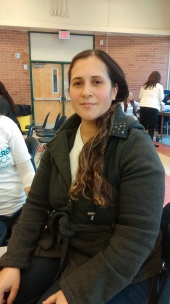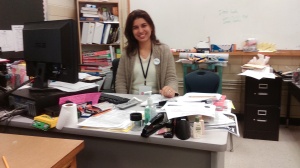Maria Espinoza came to a Doraville middle school Saturday looking to repeat what she called her “good experience’’ in the Affordable Care Act exchange.
Espinoza, 35, a construction worker, said through an interpreter that her ACA coverage for this year had worked out well, and that it was inexpensive. Enrollment is now under way for next year.
Sequoyah Middle School, where Espinoza came to sign up, was one of several metro Atlanta sites staffed by navigators, or insurance counselors, and by Enroll America personnel on the first day of open enrollment for the exchange.
With 80 percent of its students being Latino, the school was a logical place to do outreach to that population, which have high numbers of uninsured people.
The Latino community has proved at times difficult to reach, despite members’ need for coverage.
Georgia’s Latino/Hispanic population, which was small for most of the state’s history, has grown strongly and steadily since about 1990. They now constitute about 8 percent of the state’s population, but they account for 17 percent of the uninsured in Georgia.
Overall, Georgia is tied for the fifth-highest uninsured rate in the United States, with more than one in five non-elderly Georgians lacking coverage. That rate is not expected to have budged much, though more than 310,000 Georgians signed up for coverage in the exchange during last year’s open enrollment.
After the first open enrollment period, Enroll America and PerryUndem conducted a national survey that found that among Latinos who remain uninsured, 41 percent believed that they would not be able to afford health insurance. But 78 percent did not know about the opportunities for financial assistance, or subsidies, available through the exchange.
State Rep. Pedro Marin (D-Duluth) said Saturday that the Latino community generally “is an underserved and not well-informed community.’’
Enrollment events “are important, especially for the Latino community,” Marin added.
Issues with immigration
Nationally, about 6 million people in the U.S., many of them Latino, are uninsured but ineligible for coverage because they are not legally in the country, according to the Kaiser Family Foundation.
But even among eligible Latinos, enrollment has been hurt by a fear of calling attention to the immigration status of family members, as well as a lack of Spanish-language information and bilingual enrollment workers, Kaiser Health News reported.
Enroll America said there were more than 20 bilingual navigators working at Sequoyah Middle School on Saturday, where consumer traffic turned out to be less than expected.
Many Latino families have “mixed status” — members who are eligible and those who are not, Carmen Garcia of the Lifting Latina Voices Initiative in Georgia said Saturday.
“Because of the mixed status, they prefer not to do it for all the family,” she said. Some Latinos who enrolled in the exchange last year came away disappointed, Garcia added. “They felt it didn’t meet their needs.”
Meeting high deductibles was a struggle for them, she said.
“We need to continue to educate,’’ Garcia said. “A lot of Latinos are not used to getting insurance back in their [native] country.’’
Among the hurdles is lack of knowledge about U.S. health insurance terminology. That’s a problem for many people unfamiliar with the health care system, but it’s especially true when there’s already a language barrier. Enroll America held mini-classes Saturday at the middle school on such terms as “deductible” and “co-pay.”
“When a co-pay was requested, they didn’t know what that was,’’ said Enroll America’s Alex Dombronovich.
Despite these and other hurdles, the percentage of uninsured Latinos across the nation decreased from 36 percent to 23 percent by June of this year, according to a Commonwealth Fund report.
Coverage gains were greatest in the states that expanded Medicaid eligibility, the report said. Georgia’s political leadership has opted not to expand Medicaid, citing the costs to the state.
The two organizations that supervise navigators in Georgia, meanwhile, say they are focusing on the Latino population during this enrollment period.
Seedco told GHN that it is partnering with the Latin American Association, and that several other members of its consortium employ Spanish-speaking navigators and application counselors. It also conducts events at a number of locations designed to attract the Latino community, and works with Spanish-language media outlets to publicize events.
Community Health Works said it has bilingual navigators on staff to assist this population, and that events will be held throughout the state to target this community and their needs.


